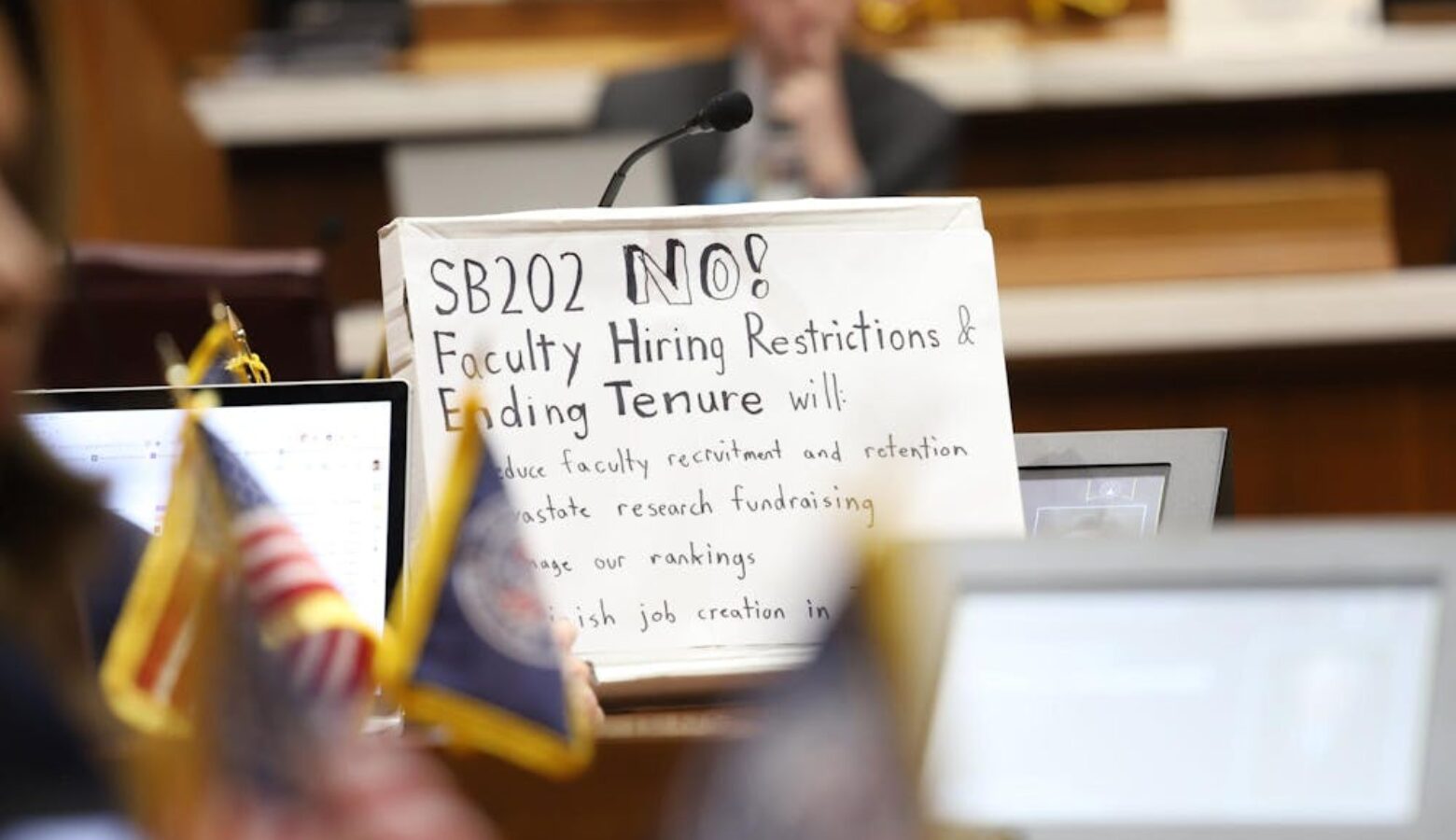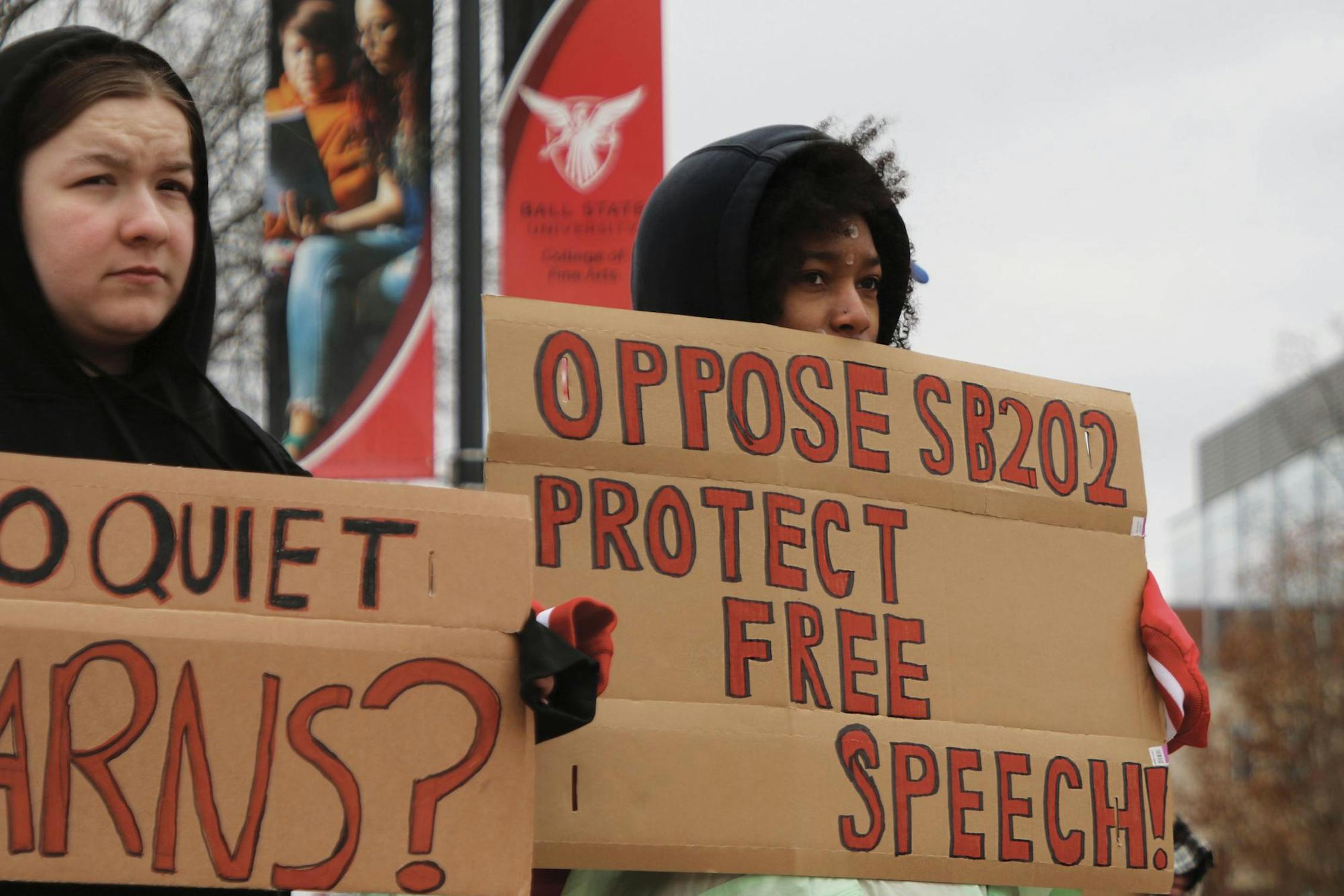Ball State students and faculty grow concerned about state Senate tenure change bill

Students and faculty from across the state flocked to the Indiana House Chamber on a Wednesday at 10:30 a.m. dressed in “Red for Ed”.
They sat through more than seven hours of legislative hearings, voting and testimonials to ensure their voices were heard for Indiana Senate Bill (SB) 202.
The topic in question: state intervention in public universities in the state of Indiana.
Indiana SB 202 has three major parts that issue concern among faculty. The bill changes the process and status of tenure, creates a new complaint mechanism for reporting and changes how diversity, equity and inclusion (DEI) affect the admissions process on campus.
In original versions of the bill, there were changes to the Board of Trustees, including changes to the appointment process of alumni members and the creation of a diversity committee. However, those additions were removed during the amendment process in the House Education Committee Feb. 21.
At Ball State, the current “evaluation of a faculty member’s eligibility for promotion or tenure” is based on teaching, scholarship and service in a professional capacity, according to an excerpt from the Faculty and Professional Personnel Handbook, Academic Year 2023-24.
According to the handbook, “Recommendations for promotion and tenure shall be initiated at the level where the candidate’s qualifications can be best identified and evaluated. In most instances, this would be the department.”
In SB 202, the Board of Trustees would now be considering the prevention of the tenure status of a faculty member if the board thinks the member is “unlikely to foster a culture of free inquiry, free expression and intellectual diversity,” as per the bill.
Additionally, the bill would mandate a five-year review of tenure faculty to ensure they are meeting the “intellectually diverse” expectation, while also meeting general and routine academic duties expected.
Institutions like Ball State University would also be required to adopt policies establishing disciplinary actions, such as termination, and salary cuts and demotion, for tenured faculty members who fail those reviews, per the bill
The topic of “intellectual diversity” has sparked concern and questions from faculty and students who are worried about how this would affect their quality of education.

“Rather than promoting a “neutral” environment, this bill will introduce a layer of political bias in higher education where none existed before, particularly as the proposed five-year review makes no exception for apolitical fields, like STEM disciplines,” the American Association of University Professors said in a statement Jan. 31.
Representative Sue Errington (D) from District 34 has spoken out against SB 202, noting how this would create a “chilling effect” for professors of humanities like women and gender studies or African American studies.
“Some fields are apolitical… but by subjecting these faculty to a five-year review, with no other basis for this review other than ideological ideology and politics, I believe that politicizes non-political fields,” she said.
In addition to this change in the tenure process, the bill creates a new report system for students. This will establish a procedure that allows for students or faculty members of a university to submit complaints about other faculty members or university staff who are not meeting the standards of intellectual diversity established in the bill.
Hilary McConnell, a third-year religious studies and studio art student at Ball State, testified at the House Education Committee Feb. 14 and shared concerns about this complaint system allowing students to “dogpile professors.”
“I think the complaint process is open to abuse and the review of professors,” McConnell said. “It leaves a lot of ambiguity that leaves room — and opens the door — for professors to be potentially fired for minor disagreements.”
At Ball State, the Bias Incident Report form exists through the multicultural website, allowing students to fill out a form if they “witness, directly experience or find evidence of a bias incident on campus,” according to the Ball State University website.
Senator Spencer Deery (R) from District 23, co-author author of the bill, suggests this could simply be an extension of the currently established bias incident report.
“You can report where you feel like somebody is fostering an environment that is not conducive to free expression and ideological diversity,” Deery said.
The bill also reads in chapter three, “If an institution receives a pledge or statement described in subsection(b), including any statement regarding diversity, equity and inclusion, or related topics, the institution may not award: admission, enrollment or employment; benefits; hiring, reappointment, or promotion; or granting tenure…”
For students and faculty on campus, this change in diversity, equity and inclusion statements creates the feeling that legislators do not care about minoritized students on campus.
“It’s also very clear [conservative legislators] do not care about underrepresented communities, since they say later on in this bill that universities may not award admission if students include DEI statements in their applications,” said Jamen Matheny, a first-year political science major at Ball State during his testimony at the House Education Committee Feb. 14.
Students and faculty from across the state have begun to question why this legislation even should exist, referencing pieces of legislation in Florida that are of a similar nature in terms of restricting the kinds of political language that can be used in the classroom.
“It’s sort of a misguided attempt on the part of some well-meaning Republicans to help conservative students feel more at home at universities,” Brigs McNiff, a second-year piano performance major and member of the Young Democratic Socialists of America, said.
The notion of allowing “conservative students [to] feel more at home at universities,” aligns with one of the reasons Deery wrote the bill originally — in addition to a hope of codifying regulations around tenure, he said.
According to a press release from Deery, “A 2022 Gallup survey commissioned by the state found only 43 percent of politically conservative students in Indiana believe they can openly express their opinions compared to 74 percent of politically liberal students.”
47 percent of adults say liberals have “a lot” of freedom to express their views on college campuses, while just 20 percent said the same of conservatives, according to polling from The Associated Press-NORC Center for Public Affairs Research and the University of Chicago Forum for Free Inquiry and Expression.
“The two [groups] that felt most discouraged from expressing their views were African American students and conservative students. And that troubles me on both grounds,” Deery said.
Michaela Ayeh is a second-year sociology major and president of Feminists for Action at Ball State. In a testimony given at the House Education Committee Feb. 14, Ayeh pointed to her worry about the “censorship” faculty and students of minority groups will face after this bill passes, due to the bill’s language that removes ‘minority” and replaces it with “underrepresented.”
“This bill is exemplary of the racism, homophobia, sexism, classism, ableism and other bigoted ideologies that bigots in this room harbor all directly without saying it,” Ayeh testified. “Especially with the substitution of “minority” with “underrepresented,” which cheapens the struggles I have faced to get to university and perverts the stance of neutrality in order to serve a conservative agenda.”
Deery said through his press secretary that this decision was important based on a FIRE study suggests that conversations of DEI topics are at times violations of the First Amendment.
The question of freedom of speech and censorship in classrooms surrounding this bill is in question for students like McNiff, who worry about the impact this bill will have.
“I don’t think it necessarily infringes a person’s freedom to say things — I think it infringes a person’s ability to not say things,” McNiff said. “This bill quite literally compels professors to represent a variety of political ideas they may or may not agree with in a classroom, and therefore, I think it is a violation of the First Amendment.”

Ball State students protest at the Scramble Light Feb. 28, 2024. The protest was organized by various student organizations, including Feminists for Action and Young Democratic Socialists of America, and took place from 1 to 3 p.m. Kate Farr, DN
As the bill moves forward in the legislative process, Deery emphasized the importance of “separating myth from fact” with this piece of legislation. He hoped this legislation can be an improved version of already existing legislation, like SB 202.
“I tried to work with universities to address those [concerning] issues, not against the universities,” Deery said. “I feel like we’re in a really good place.”
The administration of Ball State was represented for comment by Becca Polcz Rice, Ball State’s vice president for governmental relations and industry engagement, at the House Education Committee Feb. 14, before the removal of mentions of the Board of Trustees Feb. 21.
“This bill treats institutions and Boards [of Trustees] uniformly. Current law differentiates between those boards, and we ask that you consider differentiating between those boards – those boards that are highly effective like Ball State University’s,” Polcz Rice said.
Indiana University President Pamela Whitten and Provost Rahul Shrivastav have come out in opposition of the bill, as well as Purdue’s University Senate which passed a resolution in opposition of the bill.
Ball State’s Faculty Council has also passed a resolution in opposition of the bill.
“We, therefore, urge all members of the Indiana General Assembly to reject this measure,” the council said in a press release Feb. 21. “We also call on all our constituents, members of the university community and supporters of academic freedom in Indiana to actively lobby their representatives to oppose this measure.”
McNiff hoped this bill would remind students of the power of their vote and the importance of voting, especially for bills like this one that would have lasting effects on their education.
“If you are the kind of person who thinks ‘I’m just not interested in politics,’ politics is very interested in you, so I would encourage people to vote,” he said.
SB 202 passed on its third reading in the House Feb.27; 67 yeas, 30 nays. Senate Bill 202 will return to the Indiana Senate for further consideration.
Contact Olivia Ground via email at olivia.ground@bsu.edu or on X @liv_ground_25.


